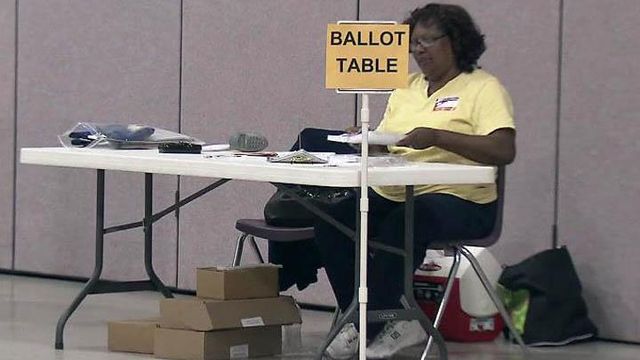NC voter turnout so low some polling places went unused
Voter turnout for North Carolina's runoff elections Tuesday didn't set a record low, but it wasn't far off.
Posted — UpdatedDespite including five statewide races and three congressional races – elections officials said it was the longest runoff ballot in modern North Carolina history – only about 221,000 people went to the polls statewide, which is less than 3.6 percent of the state's registered voters. The lowest turnout ever for a North Carolina election was 2.5 percent.
"It was painful," Gary Bartlett, executive director of the State Board of Elections, said Wednesday.
At four polling places in the state – one each in Guilford, Currituck and Tyrell counties and at Washington GT Magnet Elementary School near downtown Raleigh – no one even showed up to cast a ballot.
"During my 20-year period, the voters have basically not participated in second primaries," Bartlett said, noting the highest turnout he's seen in a runoff was 8 percent of registered voters.
North Carolina is one of just a handful of states that even have runoffs. In most states, the candidate who gets the most votes in the primary wins, but North Carolina candidates need to get more than 40 percent of the vote to avoid a runoff.
"I hate to say this because I love elections and my job is running elections, but if the voters are not going to participate, there's got to be a better way," Bartlett said.
Lawmakers need to consider changing the state's runoff law, he said, a sentiment echoed by Steven Greene, an associate professor of political science at North Carolina State University.
"Any election where you're having just 3.5 percent of the voters show up, that's not what democracy is supposed to be about," said Greene, who was the 45th and last voter Tuesday at his Cary precinct.
"There's six (workers) at my precinct, (and) to have 45 voters come through – I mean, three people an hour? – what a waste of people and resources and everything (that is)," he said. "It's just stupid."
The state and counties spent $7.5 million on the runoff to rent polling locations, hire and train workers – not all are volunteers – print ballots and other materials and maintain vote-counting machines.
Bartlett noted that the expense couldn't have come at a worse time. Most counties already have less election money than usual because of budget cuts, and they need what money they have for the November election.
Greene is a fan of instant-runoff voting, where primary voters pick a first, second and third choice. If a candidate doesn't receive 40 percent of the first votes, people's second- and third-place selections are considered.
The system allows more people to choose the final candidates, Greene said. Bartlett said the state could get set up voting machines for instant-runoff voting for about $2.5 million – a third of the cost of Tuesday's runoff.
State lawmakers have debated that idea before, but they're in no hurry to adopt it. Some said Wednesday that they aren't sure whether they'll look at runoff reforms when they come back into session next year.
Greene calls the legislative inertia a "status quo bias."
"Every single politician in that legislature was elected with the current electoral system, and they feel that got them in there," he said. "They're not interested in monkeying around with something that they feel may change their probability of getting elected.
• Credits
Copyright 2024 by Capitol Broadcasting Company. All rights reserved. This material may not be published, broadcast, rewritten or redistributed.






